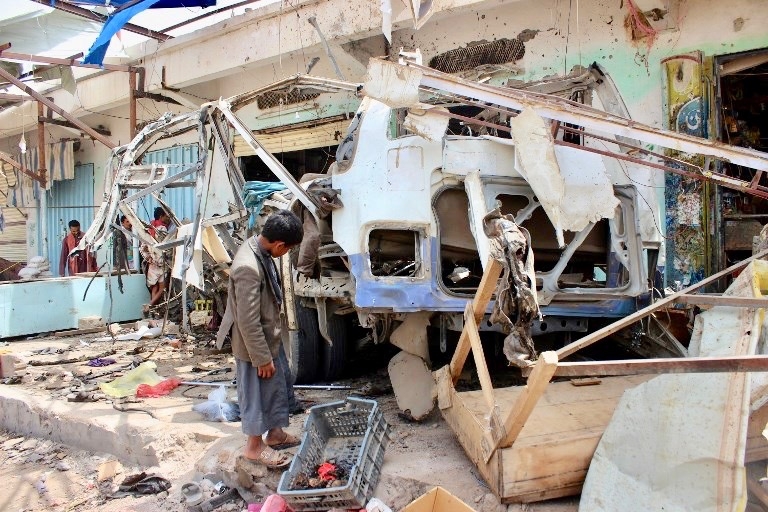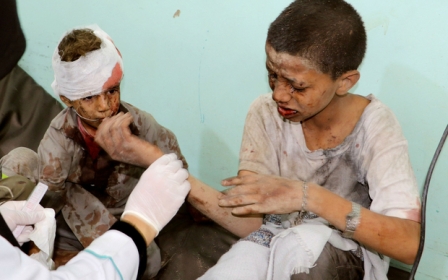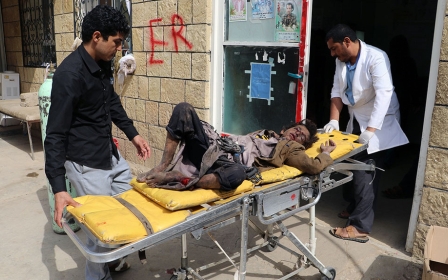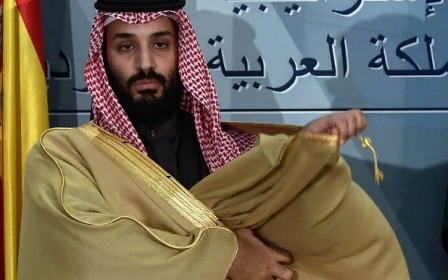Saudi-led coalition admits 'mistakes' made in deadly Yemen bus strike

The Saudi-led coalition fighting rebels in Yemen admitted on Saturday that "mistakes" had been made in an August air strike that hit a bus and killed 40 children, pledging to hold accountable anyone who contributed to the error.
The rare concession follows mounting international pressure, including from allies, to do more to limit civilian casualties in a civil war that has killed more than 10,000 people and pushed the already impoverished country to the brink of famine, Reuters said.
The Western-backed alliance fighting the Iran-aligned Houthis said at the time that the air strikes at a market in Saada province had targeted missile launchers used to attack southern Saudi Arabia a day earlier and accused the Houthis of using children as human shields.
The bombing of the crowded market killed a total of 51 people, according to the Red Cross. Fifty-six children were also among the 79 people wounded in the 9 August strike, AFP said.
The incident sparked a wave of international anger and calls by the United Nations Security Council for a "credible and transparent" investigation.
Human Rights Watch (HRW) described the Saudi attack as an "apparent war crime" on Sunday and said countries like the United States who are arming the oil-rich Kingdom were "complicit in future deadly attacks on civilians".
"The Saudi-led coalition's attack on a bus full of young boys adds to its already gruesome track record of killing civilians at weddings, funerals, hospitals, and schools in Yemen," said Bill Van Esveld, senior children’s rights researcher at the US-based group in a statement.
"Countries with knowledge of this record that are supplying more bombs to the Saudis will be complicit in future deadly attacks on civilians."
On Saturday, a statement carried by the Saudi state news agency SPA said: "The Joint Forces Command of the Coalition expresses regret over the mistakes, extends its sympathies, condolences and solidarity to the families of the victims."
The coalition said it would coordinate with the Yemeni government to compensate victims and would continue reviewing the rules of engagement to prevent the repeat of such incidents.
Coalition spokesman Mansour al-Mansour said a coalition probe had found that errors were made prior to the strike, and vowed that those responsible would be "punished".
He told a news conference in Riyadh that "an order had been given not to target the bus, which was among civilians, but the order arrived late".
Another error was that "the target did not pose an immediate threat and that targeting the bus in a residential area was unjustified at that time," he said.
Mansour repeated on Saturday that the bus had been "transporting Houthi leaders," according to information from intelligence services.
Still, he admitted the strike had "caused collateral damage".
The coalition has been accused of committing numerous blunders in Yemen.
It has recognised some of them, but regularly accuses Houthis of hiding among civilians or using them as human shields.
The Saudi-led coalition intervened in Yemen in March 2015 after the Houthis ousted President Abd Rabbuh Mansour Hadi's government from the capital Sanaa and seized large areas of the country.
The UN is set to host Yemeni government and Houthi delegations in Geneva on 6 September for talks aimed at charting a path towards reviving negotiations that broke down in 2016.
Both sides have expressed pessimism ahead of the meetings, but Yemen's foreign minister said on Saturday the government would use them as an opportunity to push forward trust-building measures.
Most importantly, Khalid al-Yamani told the Saba state news agency, the government wants progress on "the release of detainees and abductees, ending sieges of cities, facilitating the delivery of humanitarian relief and paying civil service salaries" in rebel-held areas.
UN investigators said last week that all sides in Yemen's conflict may have committed war crimes, highlighting deadly air strikes, rampant sexual violence and the recruitment of children as soldiers.
In Washington, Secretary of Defence Jim Mattis said US support for the Saudi-led coalition is not unconditional, but he suggested the United States would continue to support the alliance as it works to reduce fallout on civilians.
The bomb that killed 40 children was sold as part of a US State Department-sanctioned arms deal with Saudi Arabia, munitions experts told CNN.
Working with Yemeni journalists and munitions experts, CNN reported that the weapon that hit the bus was a 500-pound (227kg) laser-guided MK 82 bomb made by Lockheed Martin, one of the top US defence contractors.
The war has so far garnered relatively little public attention in Western countries, but there are signs that that is starting to change, particularly because of the role Western governments play in supplying arms to the coalition countries.
The Houthis, who control the capital and most of the west of the country, regularly fire missiles at southern Saudi Arabia and occasionally aim for higher-value targets, such as the capital Riyadh or facilities of state oil company Aramco.
New MEE newsletter: Jerusalem Dispatch
Sign up to get the latest insights and analysis on Israel-Palestine, alongside Turkey Unpacked and other MEE newsletters
Middle East Eye delivers independent and unrivalled coverage and analysis of the Middle East, North Africa and beyond. To learn more about republishing this content and the associated fees, please fill out this form. More about MEE can be found here.




